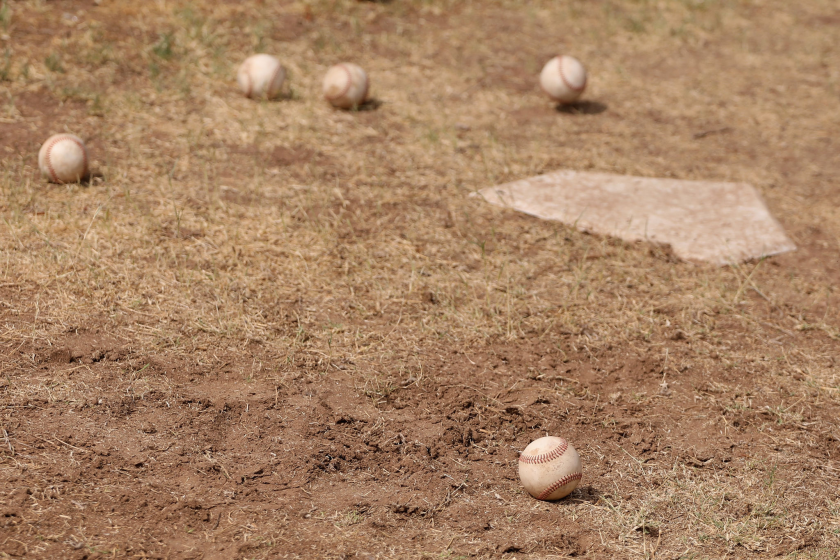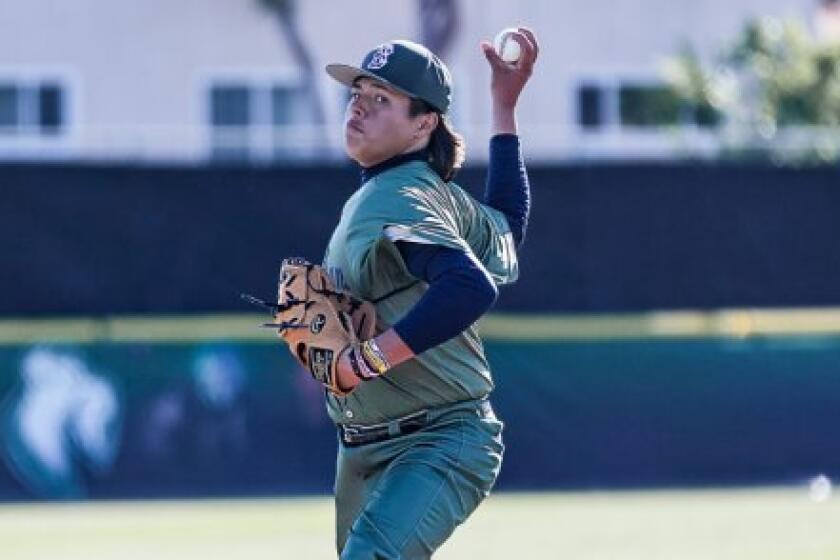College Basketball : New Mexico, USF Back, but Tulane’s Return Still in Question
- Share via
It has been almost nine years since scandal last shook the basketball program at the University of New Mexico, more than five since the University of San Francisco suspended its program after revelations involving Quintin Dailey, and approaching three years since Tulane dropped its program in the wake of a point-shaving scandal.
At two of those schools, basketball is quietly making its way back.
New Mexico won a school-record 25 games last season, and is 10-3 this season. The next time New Mexico wins a game--which could be as soon as tonight at Texas--Coach Gary Colson will move into second place on the school’s all-time list of winners, passing Norm Ellenberger, who was the coach when National Collegiate Athletic Assn. violations brought a stiff probation and Ellenberger’s exit from coaching in 1979.
San Francisco, which started playing basketball again in 1985 after a three-year layoff, went 16-12 last season and is 5-5 this season. The Dons have no Bill Russell or K.C. Jones, as they did when they won NCAA championships in 1955 and ’56. But they are respectable, and they have made a point of playing Bay Area teams--Cal, Stanford, San Jose State--in an effort to regain local prominence.
At Tulane, however, it is difficult to say whether a return to basketball is in the offing. University officials decline to discuss basketball, but the New Orleans Times-Picayune recently has printed speculation pointing to a possible return in 1990-91.
Lafester Rhodes, Iowa State’s 6-foot 8-inch center and track star, may have scored only 34 points all last basketball season, but he says he could have done far better.
This season, he already has. In Iowa State’s 102-100 victory over Iowa earlier this month, he scored 54 points. This, after averaging 3.8 points a game in his first three seasons.
Rhodes has gained fame recently as perhaps the fastest center around. He has run the 400 meters in 48 seconds as a member of the Iowa State track team.
His athletic prowess only recently has put him in the basketball limelight. Seems that last year, every time Rhodes got into a game, he started lofting shots, which resulted in diminishing playing time.
“I think I was a crowd pleaser,” he said. “When I came into the game, the fans would get wild and start encouraging me to shoot. . . . The games were already decided so I just tried to get some publicity for myself, tried to get some exposure. I was never conscious of what I was doing. I just went out and shot the ball and tried to score as much as I could.”
This season is going more smoothly--or at least it was until Butler upset Iowa State in the opening round of the Blade tournament Monday. Still, Rhodes is a big reason the 16th-ranked Cyclones got off to their best start in 47 years. His coach, Johnny Orr, figures that, with Rhodes’ speed, they may be hard to catch.
“He’s probably the fastest center in the country,” Orr said.
‘Tis the season of the holiday tournament, and the folks at the Fiesta Bowl tournament at Tucson, think they can lay claim to the very best. In Arizona, Duke, and Florida, the tournament has three top 10 teams, plus Michigan State.
“This is the best collection of teams until you get to the Final Four,” said Norm Sloan, Florida’s coach.
This is all to the good fortune of tournament organizers, who had little reason to expect such a bonanza when they signed their field two years ago. Then, Arizona and Florida were hardly top 10 contenders. But when Florida won the Big Apple NIT tournament and Arizona won the Great Alaska Shootout early this season, it became clear that the Fiesta Bowl tournament would live up to the third word in its name.
One lament: Tonight’s final is not being televised.
“I’ve seen some strange things in TV before, so nothing surprises me,” Sloan said.
Add Sloan: He never has liked zone defenses, but Sloan has had his Florida team stray from man-to-man early this season. No more, he says. “I always thought a zone defense looked like a stick-up at the 7-Eleven anyway,” he said. “Five guys standing around with their hands in the air.”
Duke has made an extra effort at handling--and preventing problems with--player-agent dealings. The university last year established a committee on counseling future professional athletes, headed by university Vice President Eugene McDonald and law professor John Weistart, an expert on sports law.
Last year, Duke basketball players Johnny Dawkins, Mark Alarie, Jay Bilas and David Henderson became the first Duke players to use the committee.
Regulations require that any agent interested in representing a Duke athlete register with the committee and complete a lengthy questionnaire. Players then meet with a selection of the prospective agents, and consider their options with help from the committee. It’s a process that Duke hopes will help the players--and help the university protect players’ eligibility.
Cedric Jenkins, Kentucky’s quiet man and sometime hero, has quietly done something else of note in Lexington, Ky. He has graduated.
Jenkins has completed the requirements for his bachelor’s degree in marketing after just 3 1/2 years, and is expected to begin working on an MBA as he plays his final semester for the Wildcats.
Sonny Smith, Auburn coach, apparently doesn’t appreciate the emphasis on football in his state.
Smith says: “In Alabama, the definition of a pervert is an adult who loves his spouse more than he loves football.”
More to Read
Go beyond the scoreboard
Get the latest on L.A.'s teams in the daily Sports Report newsletter.
You may occasionally receive promotional content from the Los Angeles Times.










